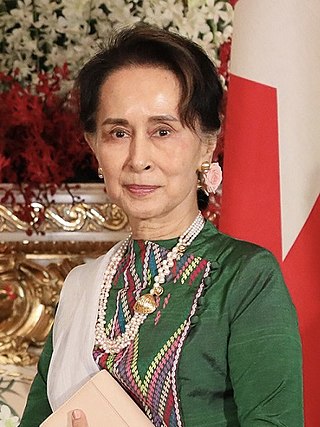
Aung San Suu Kyi, sometimes abbreviated to Suu Kyi, is a Burmese politician who served as State Counsellor of Myanmar and Minister of Foreign Affairs from 2016 to 2021. She has served as the general secretary of the National League for Democracy (NLD) since the party's founding in 1988 and was registered as its chairperson while it was a legal party from 2011 to 2023. She played a vital role in Myanmar's transition from military junta to partial democracy in the 2010s.

Myanmar operates de jure as a unitary assembly-independent presidential republic under its 2008 constitution. On 1 February 2021, Myanmar's military took over the government in a coup, causing ongoing anti-coup protests.
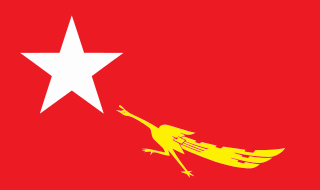
The National League for Democracy is a deregistered liberal democratic political party in Myanmar. It became the country's ruling party after a landslide victory in the 2015 general election but was overthrown in a coup d'état in February 2021 following another landslide election victory in 2020.

Myanmar is a unitary republic, with elected representatives at the national state or region levels. On the national level, the president who is the head of state and legislature, is elected indirectly through an Electoral College. According to the 2008 constitution, the term durations of the President, and Cabinet are five years. All elections are regulated by the Union Election Commission.
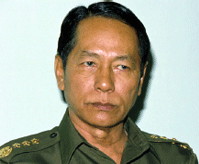
Saw Maung was a Burmese military leader and statesman who served as Chairman of the State Law and Order Restoration Council (SLORC) and Prime Minister of Burma from 1988 until 1992, when he was deposed by rival generals who disapproved Saw Maung decisions that were in favor of Aung San Suu Kyi. Beside this, he was the 8th Commander-in-Chief of the Tatmadaw. He is the first one to get the rank of Senior General which was created for him in 1990.
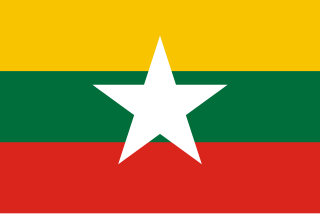
The National Coalition Government of the Union of Burma was an administration which claimed to be the government in exile of Burma (Myanmar). It had its headquarters in Rockville, Maryland, United States. It was formally established in December 1990, with Sein Win as its first prime minister. It was dissolved in September 2012.
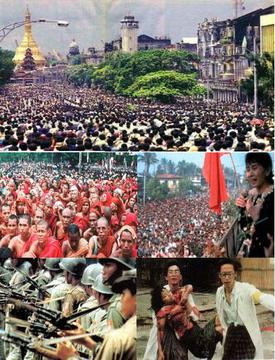
The 8888 Uprising, also known as the People Power Uprising and the 1988 Uprising, was a series of nationwide protests, marches, and riots in Burma that peaked in August 1988. Key events occurred on 8 August 1988 and therefore it is commonly known as the "8888 Uprising". The protests began as a student movement and were organised largely by university students at the Rangoon Arts and Sciences University and the Rangoon Institute of Technology.

The president of the Republic of the Union of Myanmar is the head of state and constitutional head of government of Myanmar. The president chairs the National Defence and Security Council and normally leads the Cabinet of Myanmar, the executive branch of the Burmese government, though the military prime minister leads the cabinet under the current state of emergency. Acting President Min Aung Hlaing, the head of the military and prime minister since 2021, is the current holder since Acting President Myint Swe transferred his powers in July 2024. Myint Swe had himself been installed by Min Aung Hlaing through a military coup d'état on 1 February 2021. There is no constitutional mechanism for the transfer of presidential authority outside the order of succession, making the constitutionality of the transfer questionable according to legal experts. Though a constitutionally powerful position, the presidency is a largely symbolic post under the current military government, with the only presidential action having been to declare and extend the state of emergency.
Aung San Oo is a Burmese engineer who is the elder brother of politician and Nobel Peace Prize winner Aung San Suu Kyi; the two are the only surviving children of Burmese independence leader Aung San.

General elections were held in Myanmar on 7 November 2010, in accordance with the new constitution, which was approved in a referendum held in May 2008. The election date was announced by the State Peace and Development Council (SPDC) on 13 August.
Myint Thein was a Burmese pro-democracy activist and spokesman for the National League for Democracy (NLD), the political party of Aung San Suu Kyi. He regularly met with journalists, usually in secret, both inside and outside Myanmar, in order to draw international attention to the pro-democracy struggle against the military government of the country.

The Constitution of the Republic of the Union of Myanmar is the supreme law of Myanmar. Myanmar's first constitution adopted by constituent assembly was enacted for the Union of Burma in 1947. After the 1962 Burmese coup d'état, a second constitution was enacted in 1974. The country has been ruled by military juntas for most of its history.
Kawmhu Township is a township of Yangon Region, Myanmar. It is located in the southwestern section of the Region. Kawhmu was one of the townships in Yangon Region most affected by Cyclone Nargis.

The Third Force is an informal group name given to a collection of political parties and local non-governmental organisations operating inside Burma. It was used mainly in relation with the 2010 general elections. Although campaigning for improvement of living conditions and for democratic change inside the country, the Third Force is seen as distinct from Aung San Suu Kyi and her National League for Democracy. The political parties participated in the November 2010 General elections while Aung San Suu Kyi's party called for a general boycott. Some state that the Third Force consists of liberal elements of the regime, more 'pragmatic' components of the opposition movement and a handful of local and foreign academics who advocated for a change in western policy of sanctions and isolation. The Third Force contains pro-democracy parties, ethnic minorities parties and locally established educational non-governmental organisations.
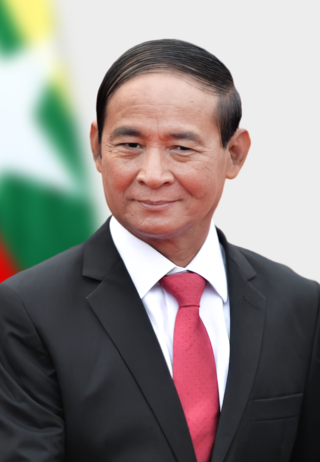
Win Myint is a Burmese politician who served as the tenth president of Myanmar from 2018 to 2021 where he was removed from office in the 2021 coup d'état. He was the speaker of the House of Representatives from 2016 to 2018. He also served as a member of parliament in the House of Representatives from 2012 to 2018. Win Myint was viewed as an important ally of State Counsellor Aung San Suu Kyi. As Suu Kyi was the de facto leader of the country, Win Myint was seen as a puppet of her.
Colonel Kyi Maung was a Burmese Army officer and politician. Originally a member of the military-backed Union Revolutionary Council that seized power in 1962, Kyi Maung resigned from the ruling council in 1963 after a public disagreement with General Ne Win, the leader of the council, on the military's long-term role in government. He joined the National League for Democracy, led by Aung San Suu Kyi, in 1988 and won a seat in the Hluttaw from Bahan Township in the 1990 general election. He was vice-chairman of the NLD from 1988 to 1997. He was imprisoned four times for a total of 12 years by successive military governments.

General elections were held in Myanmar on 8 November 2015, with the National League for Democracy winning a supermajority of seats in the combined national parliament. Voting occurred in all constituencies, excluding seats appointed by the military, to select Members of Assembly to seats in both the upper house and the lower house of the Assembly of the Union, and State and Region Hluttaws. Ethnic Affairs Ministers were also elected by their designated electorates on the same day, although only select ethnic minorities in particular states and regions were entitled to vote for them.
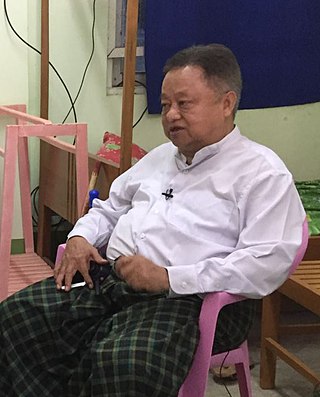
Win Htein is a Burmese politician and former inmate who served as a Pyithu Hluttaw MP for Meiktila Township. He is a patron and member of the Central Executive Committee of National League for Democracy (NLD), for which he acts as official spokesperson. Win Htein is considered to be one of the closest confidantes of NLD chairperson Aung San Suu Kyi. On the morning of 5 February 2021, he was charged with sedition and moved to the capital of Naypyidaw On 29 October 2021, he was sentenced to 20 years in prison and he was transferred from a Naypyitaw detention centre to Obo Prison in Mandalay.

General elections were held in Myanmar on 8 November 2020. Voting occurred in all constituencies, excluding seats appointed by or reserved for the military, to elect members to both the upper house — the Amyotha Hluttaw and the lower house — the Pyithu Hluttaw of the Assembly of the Union, as well as State and Regional Hluttaws (legislatures). Ethnic Affairs Ministers were also elected by their designated electorates on the same day, although only select ethnic minorities in particular states and regions were entitled to vote for them. A total of 1,171 national, state, and regional seats were contested in the election, with polling having taken place in all townships, including areas considered conflict zones and self-administered regions.

Myanmar's military government plans to hold a general election for elected seats in the Amyotha Hluttaw and the Pyithu Hluttaw of the Assembly of the Union, currently dissolved, at an unspecified time in the future. The planned election would be the first after the 2021 military coup d'état. Though military ruler Min Aung Hlaing initially promised to hold the election by August 2023, the military has since indefinitely delayed the election in the face of increasing violence.









